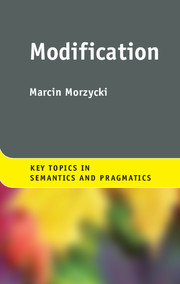6 - Crosscategorial concerns
Published online by Cambridge University Press: 05 November 2015
Summary
Introduction
One of the more interesting properties of the grammar of modification is that it can reveal connections across syntactic categories and across semantic types. There remain on our agenda a few issues that provide a taste of this – ones that involve multiple categories or interactions among several of the domains we've already examined.
This chapter takes up these crosscategorial issues. In section 6.2, we confront expressions that measure individuals by their amount, and the comparatives built out of these expressions. This requires combining our standing assumptions about degree semantics with assumptions about DPs and individuals. Section 6.3 examines the issue of crosscategorial gradability more broadly, focusing on verbs and nouns, both of which seem to be gradable in different ways and one of which introduces into the discussion some new parallels between individuals and events. Section 6.4 addresses the problem of crosscategorial modifiers that hedge or reinforce a claim, but can't be readily assimilated to the degree modifiers we've already encountered in other domains. Section 6.5 focuses on an issue we've systematically set aside throughout the book: nonrestrictive interpretations of modifiers, which turn out to extend far beyond relative clauses, their traditional home. Part of that entails struggling with what ‘nonrestrictive’ actually means. Finally, section 6.6 investigates an aspect of meaning that is inherently subjective in a particular way that can be made precise – and that makes it possible for interlocutors to contradict each other truth-conditionally without being at odds pragmatically.
Amounts and Cardinality Scales
Quantity adjectives and number words
The aim of section 6.2 is to provide a sketch of how the assumptions we've made about degrees and degree constructions in Chapters 3 and 4 might scale up to uses such as those in (1):
(1)
a. There were many monkeys.
b. There were three monkeys.
c. There were more than three monkeys.
d. There were more monkeys than there were ferrets.
The important fact about these examples is that they involve evaluating or comparing on a scale of cardinality, the number of individuals that make up a plurality.
- Type
- Chapter
- Information
- Modification , pp. 250 - 275Publisher: Cambridge University PressPrint publication year: 2015



